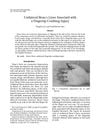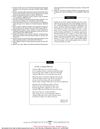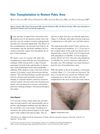14 citations,
August 2021 in “Molecular Genetics and Metabolism Reports” Pegvaliase effectively reduces blood phenylalanine levels in most PKU patients, but requires personalized plans and good communication to manage side effects.
 October 2007 in “Journal of Investigative Dermatology”
October 2007 in “Journal of Investigative Dermatology” The meeting highlighted the genetic basis of female pattern hair loss and various skin health insights.
 90 citations,
June 2006 in “The American Journal of Dermatopathology”
90 citations,
June 2006 in “The American Journal of Dermatopathology” The document concludes that accurate diagnosis of different types of hair loss requires careful examination of hair and scalp tissue, considering both clinical and microscopic features.
160 citations,
April 2008 in “Baillière's best practice and research in clinical endocrinology and metabolism/Baillière's best practice & research. Clinical endocrinology & metabolism” DHT in the human prostate is produced through multiple pathways, not just from testosterone.
 14 citations,
March 2015 in “Clinical and Experimental Dermatology”
14 citations,
March 2015 in “Clinical and Experimental Dermatology” Human placental extract and minoxidil together significantly promote hair growth.
 11 citations,
November 2005 in “The Journal of Dermatology”
11 citations,
November 2005 in “The Journal of Dermatology” A man's crushed thumb caused unusual horizontal nail ridges on all fingers of one hand.
5 citations,
January 2012 in “International journal of trichology” Chemotherapy-induced hair loss is a major concern, but various treatments show promise in preventing and reversing it.
 5 citations,
January 2012 in “Hair therapy & transplantation”
5 citations,
January 2012 in “Hair therapy & transplantation” Hair mesotherapy might help with certain types of hair loss but lacks strong scientific proof and has some risks.
 32 citations,
January 2003 in “Facial Plastic Surgery”
32 citations,
January 2003 in “Facial Plastic Surgery” The technique improves facial aging signs with a low risk of complications and a recovery time of about 3 weeks.
 December 2002 in “Archives of Dermatology”
December 2002 in “Archives of Dermatology” The poem ends by asking for case reports on serious health issues like Telogen Effluvium.
 8 citations,
January 2012 in “JIMD reports”
8 citations,
January 2012 in “JIMD reports” A new mutation in the AGPAT2 gene causes severe fat tissue loss and related health issues by reducing the protein's levels.
 2 citations,
June 2021 in “Immunopathologia Persa”
2 citations,
June 2021 in “Immunopathologia Persa” Methotrexate is effective for rheumatoid arthritis but often causes side effects like nausea and liver issues.
 41 citations,
July 2012 in “Stem Cells and Development”
41 citations,
July 2012 in “Stem Cells and Development” Low-dose UVB light improves hair growth effects of certain stem cells by increasing reactive oxygen species.
 15 citations,
February 2003 in “British Journal of Dermatology”
15 citations,
February 2003 in “British Journal of Dermatology” The study suggests computer-assisted analysis of scalp biopsies could improve hair loss diagnosis but needs more validation.
 July 2020 in “The journal of investigative dermatology/Journal of investigative dermatology”
July 2020 in “The journal of investigative dermatology/Journal of investigative dermatology” The enzymes Tet1, Tet2, and Tet3 are important for the development of hair follicles and determining hair shape by controlling hair keratin genes.
 134 citations,
January 2010 in “Biomedical research”
134 citations,
January 2010 in “Biomedical research” Low oxygen conditions increase the hair-growing effects of substances from fat-derived stem cells by boosting growth factor release.
 47 citations,
April 2003 in “Journal of dermatological science”
47 citations,
April 2003 in “Journal of dermatological science” Thujae occidentalis semen extract may help treat male pattern baldness by blocking a hair loss-related enzyme and reducing hair loss in mice.
 11 citations,
January 2007 in “Veterinary dermatology”
11 citations,
January 2007 in “Veterinary dermatology” Fulvestrant at 10 mg/kg does not promote hair regrowth in dogs with alopecia X.
11 citations,
January 2009 in “Acta Dermato Venereologica” Early and aggressive treatment can significantly regrow hair in discoid lupus erythematosus.
 14 citations,
May 2011 in “Facial Plastic Surgery Clinics of North America”
14 citations,
May 2011 in “Facial Plastic Surgery Clinics of North America” Laser hair removal is effective for dark hair but needs improvement for nonpigmented or fine hairs.
 284 citations,
November 1999 in “Neurology”
284 citations,
November 1999 in “Neurology” The article suggests managing interferon beta therapy side effects in MS with dose adjustments, medications, and patient education.
 19 citations,
August 2011 in “Facial Plastic Surgery Clinics of North America”
19 citations,
August 2011 in “Facial Plastic Surgery Clinics of North America” Hair grafting is a key method for improving scars, especially in areas with hair, by transplanting hair to hide the scar while maintaining its original characteristics.
 98 citations,
December 2003 in “The FASEB Journal”
98 citations,
December 2003 in “The FASEB Journal” Thymosin β4 promotes hair growth by activating stem cells in hair follicles.
12 citations,
July 2013 in “Circulation” Improving mitochondrial health may better treat atherosclerosis than antioxidants.
 September 2017 in “Journal of Investigative Dermatology”
September 2017 in “Journal of Investigative Dermatology” The research concluded that hyaluronic acid affects the formation and growth of hair follicle-like structures in a lab setting.
 September 2017 in “Journal of Investigative Dermatology”
September 2017 in “Journal of Investigative Dermatology” BMPs are crucial for hair growth and their decrease by androgens leads to hair loss.
 3 citations,
December 2007 in “Dermatologic Surgery”
3 citations,
December 2007 in “Dermatologic Surgery” Hair transplantation successfully restored a woman's pubic hair with natural-looking results and few complications.
 March 2024 in “Stem cell research & therapy”
March 2024 in “Stem cell research & therapy” Human dental pulp stem cell-conditioned medium, especially from hypoxic conditions, may help treat chemotherapy-induced hair loss and does not increase cancer risk.
 15 citations,
March 2014 in “Molecular Medicine Reports”
15 citations,
March 2014 in “Molecular Medicine Reports” α-spinasterol from Melandrium firmum can help reduce prostate enlargement.
 66 citations,
October 2006 in “Journal of Surgical Oncology”
66 citations,
October 2006 in “Journal of Surgical Oncology” Different scalp reconstruction methods work well, but the best one depends on the patient's unique needs.
























